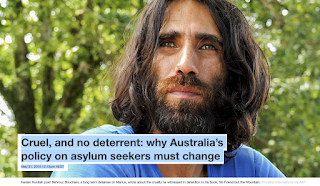"In this country, 9/11 coincided with the arrival of the Tampa – and
the general atmosphere of emergency facilitated the development of an
increasingly draconian system, one that always required careful media
management. The director general of defence communication strategies,
Brian Humphreys, reportedly testified to a Senate select committee that defence minister Peter Reith instructed his staff to not humanise the refugees.
Offshore detention made the prevention of that humanisation easier, simply by placing asylum seekers a long way from the Australian media.
It also fostered an overtly colonial and authoritarian engagement with the regimes housing the camps.
In Nauru, for instance, the Australian government helped develop the local government’s policy for excluding journalists from the detention centre, even as, according to the Lowy Institute, the island “lurched towards authoritarianism”.
In Papua New Guinea, Australia pushed for the Manus camp, even though the facility violated the constitution, and then relied on the notorious mobile squad to police it."
Read all The Guardian article
Offshore detention made the prevention of that humanisation easier, simply by placing asylum seekers a long way from the Australian media.
It also fostered an overtly colonial and authoritarian engagement with the regimes housing the camps.
In Nauru, for instance, the Australian government helped develop the local government’s policy for excluding journalists from the detention centre, even as, according to the Lowy Institute, the island “lurched towards authoritarianism”.
In Papua New Guinea, Australia pushed for the Manus camp, even though the facility violated the constitution, and then relied on the notorious mobile squad to police it."
Read all The Guardian article




No comments:
Post a Comment